Bumping into someone who ghosted you is one of those unpleasant experiences neither you nor the person who ghosted you wants to experience.
To you, it can feel so shocking that it sends shivers of discomfort down your spine and freezes you in place like a deer in the headlights.
To the person who ghosted you, on the other hand, it can feel overwhelming with guilt, shame, and suffocation and cause him or her to avoid you like the plague.
Of course, not all ghosters avoid the person they ghosted, but, unfortunately, the majority of them do because they don’t take the time to mentally and emotionally process the smothering thoughts and feelings that caused them to ghost.
Instead of working on processing the negativity, they focus on enjoying the space ghosting provided and continue to blame the person they ghosted.
Ghosters do this because holding onto the past enables them to play the blame game and reassures them that their unhealthy emotions and perceptions justify their hurtful actions.
In other words, most ghosters see themselves as victims—and the people they ghosted as perpetrators.
If you bumped into someone who ghosted you and you’re wondering if you should talk to the ghoster, my advice is to choose your battles wisely.
Be hesitant about conversing with the ghoster because the ghoster can instantly bring out your repressed emotions and cause your anxiety to spiral out of control.
And that’s what we’re going to talk about today. This post is for everyone who bumped into an ex, a friend, a family member, a colleague, or a random person who ghosted them.
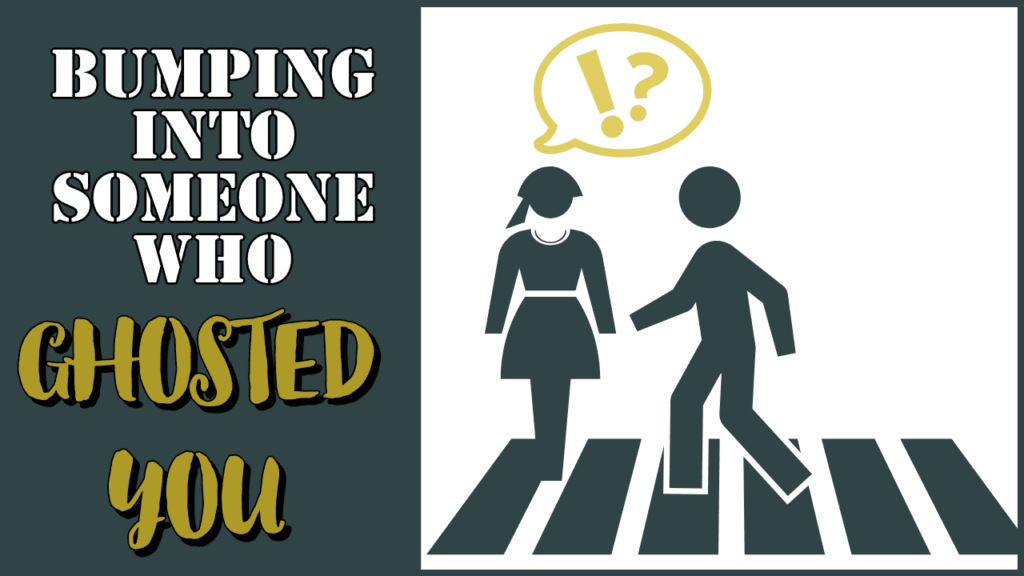

Bumping into someone who ghosted you
The worst thing about bumping into someone who ghosted you is that seeing the ghoster can trigger your fight or flight response and make you perplexed about whether you should greet the ghoster, confront the ghoster, or ignore the ghoster.
It can make you so obsessed with the ghoster that it prevents you from focusing on yourself and living your life with purpose.
Generally speaking, the more hurt you got by ghosting the more likely it is that engaging with the ghoster will force you to obsessively think about the ghoster and cause you to crave the ghoster’s recognition.
So before you even think about talking to a ghoster who triggered your separation anxiety, fears of abandonment, and other unwanted worries, make sure that you’ve gotten over the ghosting and that you can handle another rejection.
You don’t want all of your fears to resurface and bite you in the behind just because you thought it’d be nice to exchange a few friendly words with the ghoster.
What you want is to remain in control of your emotional well-being at all times—and by doing so, avoid as many emotional hindrances as possible.
Although it’s true that confronting someone who ghosted you many months ago can give you closure and help you move on, bear in mind that this is true only for people who got ghosted a long time ago.
If you recently got ghosted (less than a few months ago), it’s highly likely that talking to the ghoster will reopen your semi-healed emotional scars and inspire you to search for information on him or her all over the internet.
Now that you know that bumping into someone who ghosted you can bring out your unprocessed pain, let’s talk about when it should be okay to have a conversation with the ghoster.
When is it safe to talk to someone who ghosted you?
If you have strong feelings for the ghoster (love or hatred), you should be careful about talking to the ghoster because talking to the ghoster will most likely trigger your unprocessed anxiety, anger, fears, and a need for validation.
It will make you dependent on the ghoster for relief.
So instead of impulsively starting a conversation and getting hurt the moment you see the ghoster, take a moment of your time to discern if the ghoster even wants to speak to you.
Do this by observing if he or she holds eye contact with you and appears to be receptive. If he or she does but you’re still extremely anxious, don’t think that you need to talk to the ghoster and be overly polite.
As a person who’s recovering from abuse, all you have to do is say “Hello” or ” Hello, nice to see you” and keep walking.
But if the ghoster isn’t looking at you or is pretending not to see you, then he or she probably feels uncomfortable and doesn’t want to speak to you. In this case, simply ignore the ghoster’s presence and get on with your day.
Forcing the ghoster to respond when he or she clearly doesn’t want to engage in conversation won’t help you nor the ghoster. It will just make it extremely awkward for both of you and complicate your already extremely complicated situation.
Look at the infographic below to discern if you should talk to someone who ghosted you.
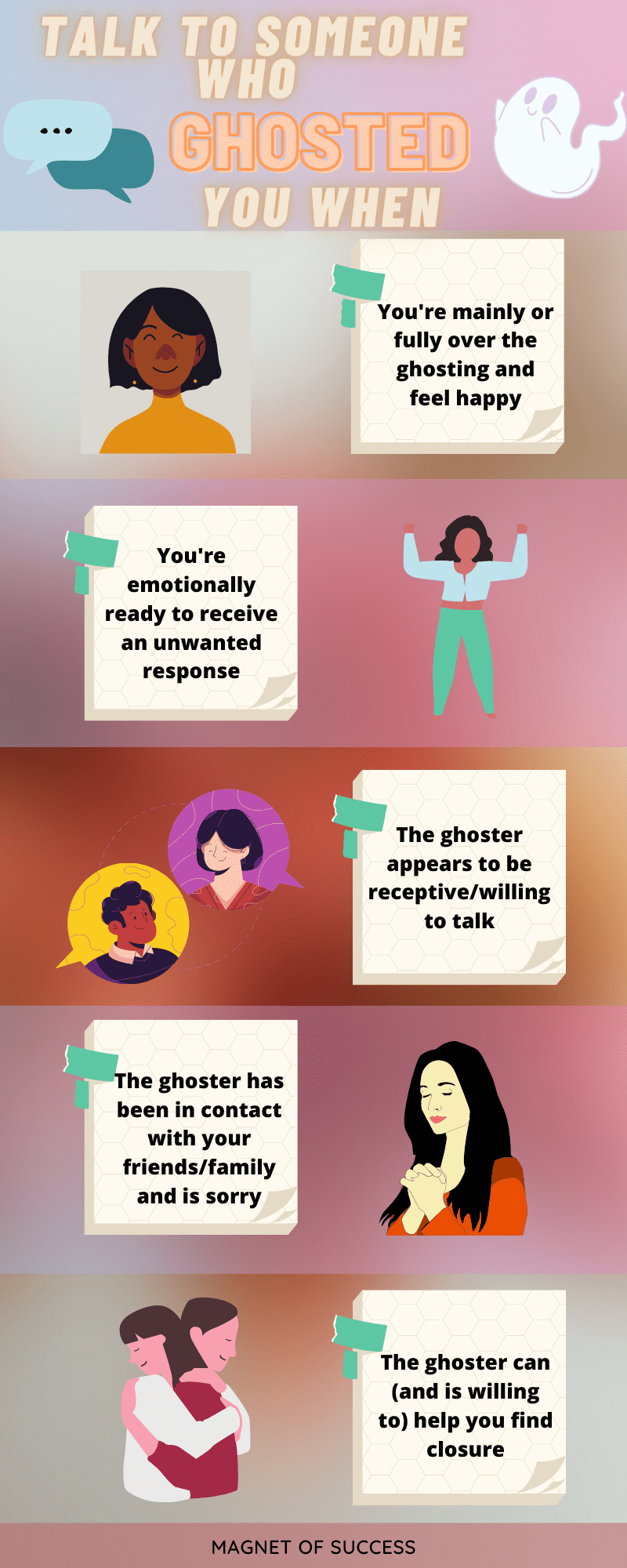

It doesn’t matter if you see the ghoster on the street, at the mall, or in a different country. If a ghoster belittled you by ghosting you and doesn’t show any interest in apologizing/conversing with you, you shouldn’t show any interest in the ghoster either.
You should be doing your best to find closure on your own—by staying out of contact.
Should you confront a ghoster?
When you see a ghoster in person, you may feel a strong urge to force the ghoster to accept responsibility. Before you act on that urge, you need to remember that a person who abandoned you cold-heartedly doesn’t care about you nor wants to help you.
If he or she wanted to help, he or she would have helped you a long time ago by communicating his or her needs in a thoughtful manner.
Since the ghoster didn’t do that and didn’t think very fondly of you, it’s more than safe to assume that the ghoster prioritized himself/herself completely and ghosted you without considering your feelings.
And because the ghoster didn’t consider your feelings back then, you can’t suddenly expect the ghoster to own up to his or her mistakes and give you the closure you need to carry on with your life.
For your own safety, you should keep your expectations of a ghoster low and keep in mind that a person who ghosted you is capable of horrible things. Maybe even something worse.
So next time you think about confronting a ghoster, think about whether:
- You’re ready to face the ghoster.
- And if the ghoster is ready to face you and be a good person.
Chances are that you need more time to process the ghosting and that the ghoster would have apologized to you already if he or she had the guts to do so.
What to do when you run into someone who ghosted you? How to talk to the ghoster?
It’s normal to feel apprehensive about talking to the ghoster. It’s normal to feel angry with him or her too.
But whatever negative emotion you feel, make sure you don’t let it affect you to the point where you call the ghoster out for his or her bad behavior.
If you let yourself operate out of fear, anger, or anxiety, you probably won’t look much better than the person who ghosted you. If you ask me, you’ll look as impulsive as the ghoster and put even more pressure on him/her.
Instead of reacting negatively to ghosting, try to stay composed at all times and show that your life doesn’t revolve around the ghoster’s ill-treatment. You can do this by being the best version of yourself and showing that you have no expectations of the ghoster.
This, of course, doesn’t mean that you should act as if everything’s okay and try to impress the ghoster. It doesn’t mean that you should pretend to be someone you’re not either.
All it means is that you should remain in control of your emotions and carry yourself with confidence and self-esteem.
Prove to the ghoster and to yourself that you’re a person with good morals and that you enjoy life too much to hold a grudge against someone who ghosted you.
If you’re eager to talk to a ghoster, my advice is to talk about the positive things in your life. Talk about everything you’ve been able to do or achieve after the ghosting and ask the ghoster simple questions.
Questions like, “How are you” and “What have you been up to.”
What to do after bumping into someone who ghosted you?
If you had a quick conversation with the ghoster and the ghoster didn’t express the desire to bond with you, there isn’t much to do. You don’t have a choice but to remain on the acquaintance level with the ghoster and keep moving on.
This is because there are certain things the ghoster must do first to win your trust back. The ghoster must first apologize, explain why he/she ghosted you, promise to never ghost you again, and finally, ask you if you’d like to be friends/partners again.
If the ghoster doesn’t do these things, the two of you are better of not speaking to each other.
Furthermore, if the ghoster apologizes and you think you can forgive the ghoster, accept the ghoster’s apology and say that you forgive him or her but not forget. This will convey to the ghoster that you respect yourself and that you won’t tolerate abuse anymore.
However, if the ghoster doesn’t apologize and shows no interest in you after the conversation, then forget about being on good terms with the ghoster. The ghoster doesn’t want to be friends with you because his or her perceptions of you haven’t changed yet.
They haven’t had a chance to yet, so stay away from the ghoster and find someone with whom you can have a meaningful relationship.
I bumped into my ghosting ex-boyfriend
When my ex ghosted me to be with his ex, he hurt me more than I thought he could. He completely crushed my self-esteem and made it extremely difficult for me to love myself and trust people.
But, unfortunately, that wasn’t the last time my ex hurt me.
He also hurt me a few months after ghosting me when I saw him on the opposite side of the street and said hi to him.
I wasn’t over him yet at that time, so I greeted him, hoping he would respond and show me he cared. But instead of feeling empathy for me, he looked at me for a fraction of a second and pretended not to recognize me.
His indirect rejection immediately rose my anxiety levels, triggered the fears I talked about in this article, and made me feel so insignificant. So much so that it took the rest of my low self-esteem away and filled me with a mixture of negative emotions.
I desperately wanted my ghoster ex to say hi back and acknowledge my worth, but because he didn’t respond at all, I took his lack of reciprocation personally and thought he ignored me because I wasn’t worthy of attention.
The truth is that it was the other way around. My ex ghosted me and acted as if I didn’t exist because he was ashamed of himself and unwilling to rectify the problem he got himself into by ghosting me.
He didn’t have the strength to admit he cheated on me with his ex, so he did what people who lack the ability to solve problems do. He ran away as fast as his legs would carry him.
It took me a while to process his rejection, but when I did, realized that my ex was a coward and that I was better off without him.
The moral of my personal experience is to be careful not to reach out to an ex who ghosted you and showed you a very dark side of him/her. You have to avoid getting rejected again and keep in mind that your only job as a person who got ghosted is to keep healing.
Your ex or the person who ghosted you on the other hand has power over you and must first lose that power to appreciate you. Only then can he or she talk to you and apologize for everything he or she had put you through.
Here are my tips on bumping into someone who ghosted you.
- Don’t overthink and try to relax.
Breathe in and breathe out. This simple breathing technique will help you control your emotions and allow you to think clearly around your ex. I know it seems silly, but people often hold their breath when they panic. - Consider your emotional well-being before you talk to the ghoster.
Talk to the person who ghosted you only if you’re over the ghosting and can handle another rejection. - See if the ghoster wants to talk.
Before you greet the ghoster and engage in conversation, see if the ghoster is willing to talk. You can discern if he/she is interested very quickly by looking where the ghoster is looking. - Say hi and keep walking.
If you’re not ready to talk (still anxious, depressed, or miserable), briefly greet the ghoster and show politeness. If the ghoster doesn’t reply, bear in mind that it has nothing to do with you. It’s the ghoster who doesn’t wish to be a decent human being. - Don’t bring up the ghosting.
If you want to exchange a few quick words, feel free to do so. But don’t bring up the past, especially the ghosting. - Keep the conversation short.
Be nice and friendly, but don’t prolong the conversation. The first encounter with the ghoster should be concise. - Show your progress.
Show you improvements, changes, achievements, and the things you’ve been working on since you got ghosted. Make it seem like ghosting didn’t affect you.
And that’s it for this article. Are you worried about bumping into someone who ghosted you? Have you run into that person already and you’re wondering what to do? Comment below.
And if you prefer personalized 1-on-1 guidance, click here to see our coaching plans.

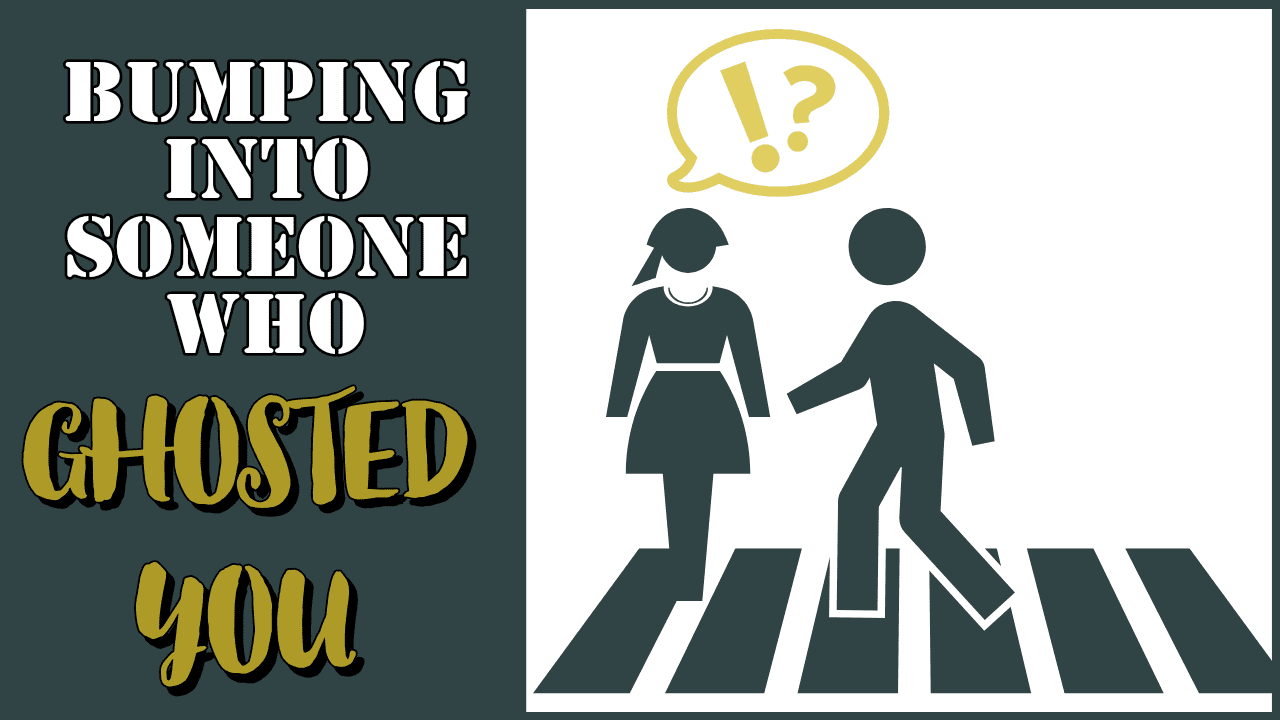
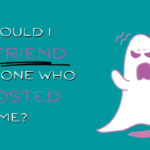


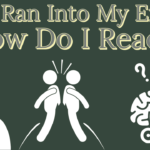
Sorry but this is stupid. Ive ghosted two friends before, but I did so because they were both toxic in their own ways and would either not care about our friendship enough to change when I expressed how I felt, or straight up get angry at me for letting them know how they’re actions made me feel. If I bumped into them in public and they confronted me, I sure as hell do not owe them an apology or an explanation as to why I ghosted them. If anything they owe me an apology for making me feel so bad in our friendship that I felt the need to ghost them. Now obviously there are times where people are douchebags and will ghost someone just because they are too lazy or careless to communicate their feelings and would rather take the easy way out, but trust me everyone I know who has ghosted someone did so with a good reason and imo don’t owe the ghostee anything.
Hi Leanne.
Ghosting means running away without ending things properly. You have every right to end relationships and friendships with people. But it’s in the way that you end them that shows who you are and how you handle negative emotions. If you felt neglected or abused and things didn’t improve, it’s okay to distance yourself from people. But do expect them to get hurt too and wonder why you did what you did. You have to remember something very important. Although you have the right to leave, you’re not the only person hurting. People have their own issues and reasons for behaving in certain ways. If you understand those reasons, you may see that they need help more than you do. Just some food for thought.
Best,
Zan
Well written
Huh such a strong topic. Thank god my relationship ended badly with cheat but not with ghosting
I mean I don’t know which is the worst tho
Thank you